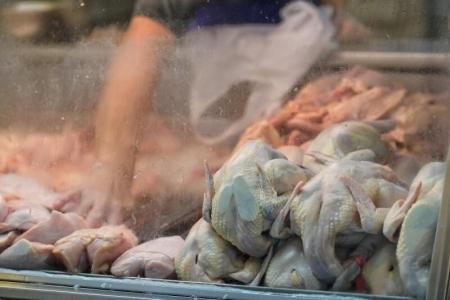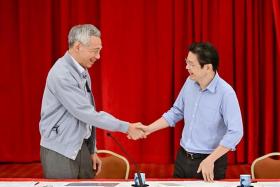Food supply disruptions regrettable, but S'pore has been building buffer, diversifying sources: PM Lee
TOKYO - It is regrettable but not surprising that Singapore is affected by disruptions in the food supply chain due to the Ukraine war and high inflation, Prime Minister Lee Hsien Loong said on Friday (May 27).
The Republic has been working to secure its supply of food for several years, including by building a buffer of stocks and diversifying its sources of imports, so that Singaporeans are not unduly affected in the event of shocks, he added.
"Governments are under pressure and sometimes they take unconventional measures, for example, interdicting exports of products, and several governments have done this.
"It is regrettable that as a consumer country which imports food, we are adversely impacted," PM Lee said in an interview with Singapore media on the final day of his four-day working visit to Tokyo.
While he did not single out any country in his response, Malaysia said earlier this week that it would halt exports of 3.6 million whole chickens per month from June 1 until production and prices stabilise.
India has also announced plans to restrict sugar exports to prevent a surge in domestic prices.
PM Lee recalled how, in the early days of the Covid-19 pandemic, supply chain disruptions meant masks and personal protective equipment or PPE were in short supply.
Some countries scrambled to meet their own needs by interdicting and requisitioning supplies which would be manufactured in their own country, or sometimes even when transiting in the country.
Seeking redress at the World Trade Organisation is an option if there are violations of global trading rules, but PM Lee said this was a lengthy process.
In the current situation, the immediate urgency is to secure the supply of food.
"The answer is not what we do now, but what we have been doing now for several years, which has been to build up our buffer stocks and resiliency and diversify our sources," PM Lee said.
"So that (when) any single source is interrupted, we are not unduly affected and if you can't buy chicken from one place, you can buy from other countries. This time it is chicken, next time it may be something else. We have to be prepared for this," he added.
Singapore imports over 90 per cent of its food, and diversification is a key strategy to ensure a supply of safe food.
While Malaysia is the main source of fresh chicken, it accounted for 34 per cent of the Republic's chicken supply last year, with the rest imported from Brazil, the United States and other countries.
On Thursday (May 26), Minister of State for Sustainability and the Environment Desmond Tan said there is adequate supply of chicken in Singapore, and urged people to refrain from panic buying.
Supermarket chain FairPrice also said it had a stockpile of frozen chicken that can last about four months, with another two months of supply on the way.
As for sugar, importers said Singapore is not likely to be affected by India's export curbs. On Friday (May 27), a Singapore Food Agency spokesman said sugar is imported from over 40 countries, including Australia, India, Malaysia and Thailand.
The spokesman added that should there be a disruption to any one source, it would work with importers to tap on alternative sources to keep supply stable.
PM Lee said inflation and cost of living are pressing issues in a very unsettled world, but cautioned: "In the scheme of things, many more disruptive things can happen than just some price adjustments. And we are seeing some of that now."
Get The New Paper on your phone with the free TNP app. Download from the Apple App Store or Google Play Store now



